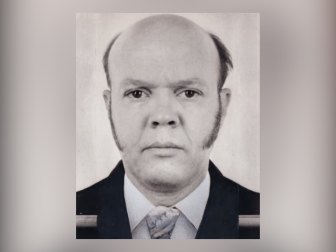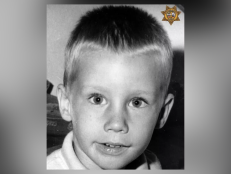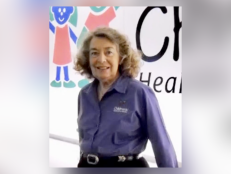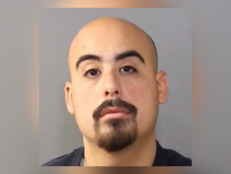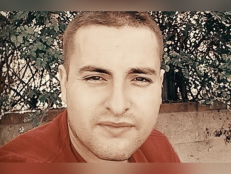'Happy Face Killer': How Keith Jesperson’s Daughter Discovered His Deadly Secret
“There was just something ‘off’ about him,” Melissa Moore says of the serial killer.

Keith Jesperson during a court appearance in Portland, Oregon, November 1995 [Associated Press]
The daughter of a man dubbed the “Happy Face Killer” has revealed the suffering she went through after discovering her father was a serial rapist and murderer who preyed on what he once claimed was as many as 185 people over a five-year span.
In 1995, Keith Hunter Jesperson, a long-haul truck driver, confessed to murdering women in California, Oregon, Wyoming, Florida and Washington.
His daughter, Melissa Moore, was 16 when she learned the brutal truth about her dad.
“I'll never forget the day I found out. I'd come home from school and my mom called out for me and my siblings,” Moore, 41, recalled on the Vice podcast Extremes in 2020. “Then she said, ‘Your father's in jail.’ My brother asked, ‘For what?’ And she said, ‘For murder.’”
Moore’s mother, who officially divorced Jesperson in 1990 after leaving him years earlier, wasn’t forthcoming with more information, so the teen went to the library to read reports about her dad’s trial.
“And what I learned was that it wasn’t for just one murder, it was actually for the murder of eight women,” Moore said.
In January 1990, Jesperson was at a billiards hall near Portland, Oregon, when he spotted his first known victim, 23-year-old Taunja Bennett.
“They started playing pool together and he invited her back to the house. From there, she started to reject his advances,” Moore said. “He then unleashed his rage and, from what I’ve heard, he just completely smashed her face — brutalized her — to the point where detectives found teeth in different locations around the house. Then, once he'd gotten that taste of blood, he couldn’t be stopped.”
Four years after Bennett’s death, Jesperson reportedly became upset he wasn’t receiving media attention for the murder because another couple was wrongly convicted of the crime. He began to leave written confessions on bathroom walls at truck stops.
In one message, he gloated: “I beat her to death, raped her and loved it. Yes, I’m sick, but I enjoy myself too. People took the blame and I’m free.”
He ended the confession with a smiley face.
When Jesperson still didn’t get the kind of response he expected, he sent notes to the media and police, signing each with a smiley face. In one six-page letter to The Oregonian newspaper, the serial killer revealed where he had dumped five of his victims’ bodies, Medium reported.
On March 30, 1995, police arrested Jesperson for the strangulation murder of his longtime girlfriend, 41-year-old trucker Julie Ann Winningham. Jesperson claimed he killed Winningham because he believed she was after his money. While in custody, he eventually confessed to a total of eight murders, including those of Cynthia Lyn Rose, Laurie Ann Pentland, Angela Subrize, and three still-unidentified women.
Looking back, Moore said her hulking 6-foot 6-inch dad, now 65, had two distinct sides to his personality, “one very much opposing the other.”
“On the surface he was a bubbly, charismatic man, but then there was something underneath that. There was just something ‘off’ about him,” she noted on the Vice podcast.
“After he was arrested a lot of weird moments in my childhood made sense,” she said.
In a disturbing example of Jesperson’s dark side, Moore revealed that as a young child she and her little brother found a stray cat. Her father noticed the two playing with the animal, and he began to pet it.
“I remember the smile on his face. And I could see blood coming off of my dad’s forearms, but that didn’t seem to faze him. He just continued, until all of a sudden the cat went limp.” - Daughter Melissa Moore
“Then all of a sudden, he took his huge hands and started to strangle it. The cat’s reaction was to fight for its life, and it started to claw him, but my dad was absolutely enjoying himself,” she said. “I remember the smile on his face. And I could see blood coming off of my dad’s forearms, but that didn’t seem to faze him. He just continued, until all of a sudden the cat went limp.”
Moore said her father defended his parenting skills after his arrest for the murders.
“My father never apologized,” said Moore, who last saw Jesperson decades ago. “He said that he was a good father except for his ‘eight errors in judgment’. That’s what he called the murders — ‘errors in judgment’.”
“All of this absolutely changed how I saw myself,” Moore said. “I felt guilty by association. I felt that something must be wrong with me. It was confusing. It definitely changed how I saw myself as a person, until later in my adult years.”
Moore was eventually able to face the trauma of her past through therapy and self-work.
“I realized that it was nothing that I did. There was nothing I could do to bring those poor women back and there was nothing I could say to the victims' families to soften the blow of losing their loved ones,” she said. “So, I had a choice. I could either accept the past or I could continue living like I was the scum of the earth — and that was no way to live.”
She added: “I don’t feel that there will ever be closure for the victims’ families, and I don’t think justice is ever fully achieved. The only thing I can be thankful for is that he is in a place where he can’t ever hurt anybody again.”
Jesperson is currently serving three consecutive life terms at Oregon State Penitentiary in Salem.
For more on this case, stream Very Scary People: The Happy Face Killer on discovery+.
Serial Murderer Known As ‘Trailside Killer’ Stalked Victims Hiking In California Wilderness
David Joseph Carpenter fatally shot seven people during his reign of terror in the early 1980s.
